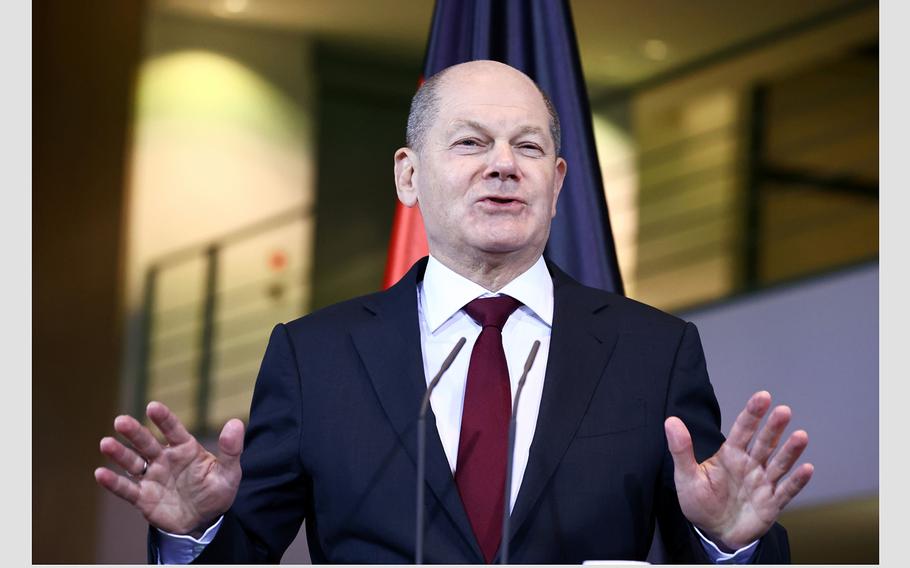
Olaf Scholz, Germany's chancellor, makes a press statements ahead of a meeting at the chancellery in Berlin, Germany, on Wednesday, Nov. 22, 2023. (Liesa Johannssen-Koppitz/Bloomberg)
German Chancellor Olaf Scholz sought to calm fears about the repercussions from last week’s ruling by the nation’s top court, pledging that his government will fix the budget turmoil the judgment unleashed.
In a video statement published Friday in Berlin, Scholz promised that financial aid to ease the burden from high energy prices was not under threat and said the court judgment left the door open for such emergency assistance to continue.
The government won’t be diverted from initiatives including addressing the wider fallout from Russia’s war on Ukraine, maintaining support for Kyiv and modernizing and greening Europe’s biggest economy, he added.
“All of these goals are and remain right,” he said. “We will continue to follow all of these goals.”
Scholz and senior officials from Germany’s three-party governing alliance have been holding emergency talks to determine the full implications of the shock Constitutional Court judgment since it was delivered on Nov. 15.
Finance Minister Christian Lindner froze almost all new federal spending for this year and will present a revised 2023 finance plan next week that will include a suspension of a limit on net new borrowing for the fourth straight year.
The court ruling called into question Germany’s use of special off-budget funds and Lindner has been forced to retroactively account for about €42 billion ($46 billion) of new debt earmarked to ease the burden of high electricity and gas prices on households and companies.
The government has yet to decide how it will deal with the potential impact on next year’s finance plan, which was supposed to go to parliament next week but has now been delayed indefinitely. Any action it takes to overhaul the special funds potentially opens it up to more legal challenges.
In his video message, Scholz insisted that the ruling coalition will not put off making “the necessary decisions,” and said it’s already working “to ensure that the federal government and the Bundestag take all the decisions required for the 2024 budget quickly.”
Scholz came under pressure Friday to resolve the situation from European Central Bank President Christine Lagarde, who said the budget chaos is “an issue for us.”
“We have to forecast, we have to anticipate what fiscal space countries will have, what policies they will deploy and what is the likely economic result,” Lagarde said in Frankfurt.
“Not to understand yet where Germany’s budget will be next year is not helping us to do our projections,” she added. “I hope that solutions will be found.”
Lindner pledged Friday that “there will be solutions” and echoed Scholz’s message that the government is sticking to its “broader goals.”
“For certain goals we now have to find other ways and we are making the effort,” he said at the presentation of a new coin in Berlin. “We need to clear the ship and then set course again.”
In another setback for the government on Friday, the upper house of parliament refused to sign off on a law pushed by Lindner designed to foster competitiveness and promote investment in climate friendly technologies. An agreement must now be sought in a joint mediation committee of both houses of parliament.
Lindner’s ministry also announced that Werner Gatzer, a long-serving deputy finance minister responsible for budget planning, will leave at the end of the year and be replaced by Wolf Reuter, the current director general and chief economist.
With assistance from Kamil Kowalcze, Michael Nienaber, Sonja Wind and Alexander Weber.
Visit bloomberg.com
©2023 Bloomberg L.P.